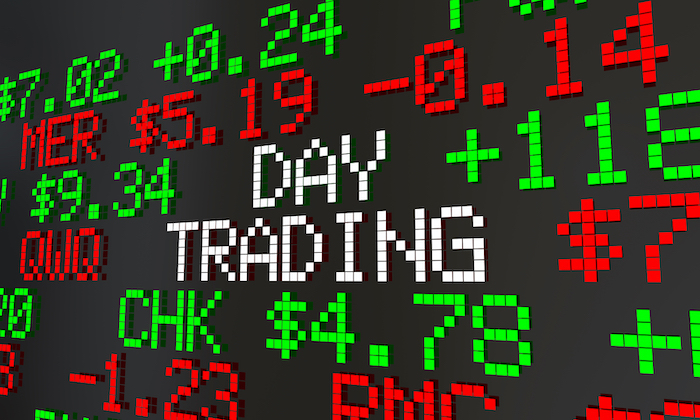Day trading is a popular way to invest in financial markets. It involves buying and selling financial instruments, such as stocks, options, futures, and currencies, within the same day. The goal of day trading is to make a profit by exploiting short-term market movements. Day traders can potentially earn significant returns on their investments, but risks are also involved. In this article, we will explore the risks and rewards of day trading and provide tips on succeeding in this high-risk, high-reward activity.
Understanding Day Trading
Day trading, a short-term trading approach that entails purchasing and selling financial instruments on the same trading day, is a complex and intricate undertaking. In order to achieve success in day trading, traders must be proficient in technical analysis, fundamental analysis, and have a deep understanding of the markets. Their preferred trading instruments may include stocks, options, futures, currencies, or other financial products, depending on their interests and expertise.
Day trading necessitates an extensive investment of time and effort, as traders must remain up-to-date on market developments, monitor their positions closely, and act rapidly when opportunities arise. Additionally, they must have access to reliable trading tools like real-time market data, advanced charting software, and order execution platforms. The volatility of the markets, coupled with the complexity of day trading, makes it a challenging endeavor that requires a high degree of skill, knowledge, and discipline.
The Risks of Day Trading
Engaging in day trading is an endeavor that involves substantial risk and could result in notable financial losses. Traders must acknowledge the perils and take appropriate measures to mitigate them. Several risks are associated with day trading, including but not limited to:
Emotional Risks
Day trading can be emotionally demanding, as traders need to make quick decisions under pressure. The fear of missing out on a profitable trade or losing money can lead to impulsive decisions, resulting in losses.
Financial Risks
Day trading necessitates the use of leverage, enabling traders to execute trades with funds exceeding their actual capital. This can potentially generate amplified profits, but it can also amplify losses. Consequently, traders must be aware of the risks of using leverage and prudently manage their positions to mitigate potential losses.
Market Risks
Day trading involves trading in volatile markets, which can result in significant price swings. Traders need to be able to handle the ups and downs of the market and adjust their positions accordingly. They also need to be aware of market developments that can affect the market, such as news announcements and economic data releases.
The Rewards of Day Trading
Despite the risks involved, day trading can also be highly rewarding. Traders can potentially earn significant returns on their investments and enjoy other benefits, such as:
Potential for High Returns
Day trading offers the potential for high returns, as traders can profit from short-term market movements. With the right strategy and risk management, traders can earn significant profits on their investments.
Control over Investments
Day traders have control over their investments, making all the decisions regarding when to buy and sell. This can be empowering for traders who want to take control of their financial future.
Flexibility
Day trading offers flexibility, as traders can work from anywhere with an internet connection. This allows traders to work from home, the office, or while traveling, providing freedom that is not available with traditional jobs.
Strategies for Successful Day Trading
To succeed at day trading, traders need to develop a sound strategy that considers the market’s risks and rewards. Some of the strategies that traders can use include:
Technical Analysis
Technical analysis involves analyzing price charts and market data to identify trading opportunities. Traders use technical indicators, such as moving averages, trend lines, and chart patterns, to make trading decisions.
Fundamental Analysis
Fundamental analysis involves analyzing economic and financial data to identify trading opportunities. Traders use fundamental indicators, such as earnings reports, economic data releases, and news announcements, to make trading decisions.
Risk Management
Risk management involves managing the risks involved in trading. Traders must set stop-loss orders to limit their losses, use appropriate position sizing to manage risk, and diversify their investments to minimize their exposure to any asset.
The Importance of Research and Education
Successful day traders need to be informed and educated about the market. Traders must stay current on market developments, learn new trading strategies, and continuously improve their skills. They also need access to reliable trading tools and educational resources to help them make informed trading decisions.
Setting Realistic Expectations
Day traders need to set realistic expectations for their trading performance. Traders must understand that day trading involves risks and that not every trade will be profitable. Traders must be patient, disciplined, and persistent to succeed in the long run.
Choosing the Right Brokerage
Day traders must choose a brokerage that offers low trading fees, reliable trading tools, and access to real-time market data. Traders should also look for a brokerage that offers educational resources, customer support, and a user-friendly trading platform.
Developing a Trading Plan
Successful day traders must have a trading plan outlining their trading strategy, risk management, and goals. Traders should develop a trading plan considering their trading style, risk tolerance, and financial goals.
Emphasizing Discipline and Patience
Discipline and patience are essential for successful day trading. Traders must stick to their trading plan, manage emotions, and avoid impulsive decisions. They must also be patient, as profitable trading opportunities may not present daily.
Managing Emotions
Managing emotions is crucial for successful day trading. Traders must avoid becoming too emotional about their trades, as this can lead to impulsive decisions and losses. Traders should learn to control their emotions and avoid letting fear, greed, or hope influence their trading decisions.
Avoiding Common Mistakes
Day traders must avoid common mistakes, such as overtrading, chasing losses, and ignoring risk management. Traders should learn from their mistakes and continuously improve their trading skills.
Maintaining a Balanced Lifestyle
Day traders must maintain a balanced lifestyle to avoid burnout and maintain mental and physical health. Traders should exercise regularly, eat a healthy diet, and spend time with family and friends. They should also take breaks from trading and engage in hobbies and other activities they enjoy.
FAQs
Q: Is day trading a good way to make money?
A: Day trading can be a lucrative way to make money but involves significant risks. Traders must develop a sound strategy, manage their risks, and continuously improve their trading skills to succeed in the long run.
Q: How much money do I need to start day trading?
A: The money needed to start day trading depends on the trader’s goals, risk tolerance, and trading strategy. Traders can start with as little as a few hundred dollars, but it’s recommended to have at least $25,000 in trading capital to meet the minimum equity requirements for pattern day trading.
Q: Is day trading legal?
A: Day trading is legal in most countries, but traders must comply with relevant securities laws and regulations. Traders should consult a financial advisor or attorney to ensure they trade legally.
Q: What are some common mistakes to avoid in day trading?
A: Common mistakes to avoid in day trading include overtrading, chasing losses, ignoring risk management, and letting emotions influence trading decisions. Traders should learn from their mistakes and continuously improve their trading skills.
Q: Can I day trade with a full-time job?
A: It is possible to day trade with a full-time job, but traders must be disciplined, patient, and flexible. Traders can trade before or after work or during breaks, but they must ensure adequate time and focus on making informed trading decisions.




